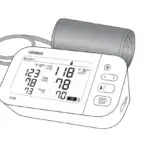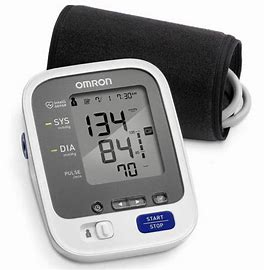

Omron Blood Pressure Monitor Manual and Symbols
INTRODUCTION
Thank you for purchasing the Omron® BP760 IntelliSense® Automatic Blood Pressure Monitor with ComFitTM Cuff.Your new digital blood pressure monitor uses the oscillometric method of blood pressure measurement. This means the monitor detects your blood’s movement through your brachial artery and converts the movements into a digital reading. An oscillometric monitor does not need a stethoscope so the monitor is simple to use.BP760 comes with the following components:• Monitor
- Storage Case
- Instruction Manual printed in English and Spanish
- Quick Start Guide
- ComFitTM Cuff
- AC Adapter
The BP760 IntelliSense® Automatic Blood Pressure Monitor is intended for home use.
SAFETY INFORMATION
To assure the correct use of the product basic safety measures should always be followed including the warnings and cautions listed in this instruction manual.
| SAFETY SYMBOLS USED IN THIS INSTRUCTION MANUAL | |
|
WARNING |
Indicates a potentially hazardous situation which, if not avoided, could result in death or serious injury. |
|
CAUTION |
Indicates a potentially hazardous situation which, if not avoided, may result in minor or moderate injury to the user or patient or damage to the equipment or other property. |
OPERATING THE DEVICE
- Contact your physician for specific information about your blood pressure. Self-diagnosis and treatment using measured results may be dangerous. Follow the instructions of your physician or licensed healthcare provider.
- DO NOT adjust medication based on measurement results from this blood pressure monitor. Take medication as prescribed by your physician. Only a physician is qualified to diagnose and treat High Blood Pressure.
- The monitor is not intended to be a diagnostic device.
- If battery fluid should get in your eyes, immediately rinse with plenty of clean water. Contact a physician immediately.
- Read all of the information in the instruction manual and any other literature in the box before operating the unit.
OPERATING THE DEVICE (continued)
- This device is intended for use in measuring blood pressure and pulse rate in the adult population. Do not use this device on infants or persons who cannot express their intentions.
- Read the Special Conditions section (page 30) of the instruction manual if your systolic pressure is known to be more than 220 mmHg. Inflating to a higher pressure than necessary may result in bruising where the cuff is applied.
- Operate the device only as intended. Do not use the device for any other purpose.
- Dispose of the device, components and optional accessories according to applicable local regulations. Unlawful disposal may cause environmental pollution.
- Do not use a cellular phone near the device. It may result in an operational failure.
- only Omron authorized parts and accessories. Parts and accessories not approved for use with the device may damage the unit.
- only 1.5V alkaline batteries with this device.
- Do not use other types of batteries. This may damage the unit.
RISK OF ELECTRICAL SHOCK
- Do not plug or unplug the power cord into the electrical outlet with wet hands.
- Do not overload power outlets. Plug the device into the appropriate voltage outlet.
CARE AND MAINTENANCE
- Do not subject the monitor to strong shocks, such as dropping the unit on the floor.
- Do not submerge the device or any of the components in water.
- Store the device and the components in a clean, safe location.
- Changes or modifications not approved by Omron Healthcare will void the user warranty. Do not disassemble or attempt to repair the unit or components.
BEFORE TAKING A MEASUREMENT
To ensure a reliable reading follow these recommendations:
- Avoid eating, drinking alcohol, smoking, exercising, and bathing for 30 minutes prior to taking a measurement. Rest for at least 15 minutes prior to taking the measurement.
- Stress raises blood pressure. Avoid taking measurements during stressful times.
- Measurements should be taken in a quiet place.
- Remove tight-fitting clothing from your arm.
- Sit on a chair with your feet flat on the floor. Rest your arm on
- table so that the cuff is at the same level as your heart.
- Remain still and do not talk during the measurement.
- Wait 2-3 minutes between measurements. The wait time allows the arteries to return to the condition prior to taking the blood pressure measurement. You may need to increase the wait time depending on your individual physiological characteristics.
- Keep a record of your blood pressure and pulse readings for your physician. A single measurement may not provide an accurate indication of your true blood pressure. You need to take and record several readings over a period of time. Try to measure your blood pressure at about the same time each day for consistency.
KNOW YOUR UNIT
Components: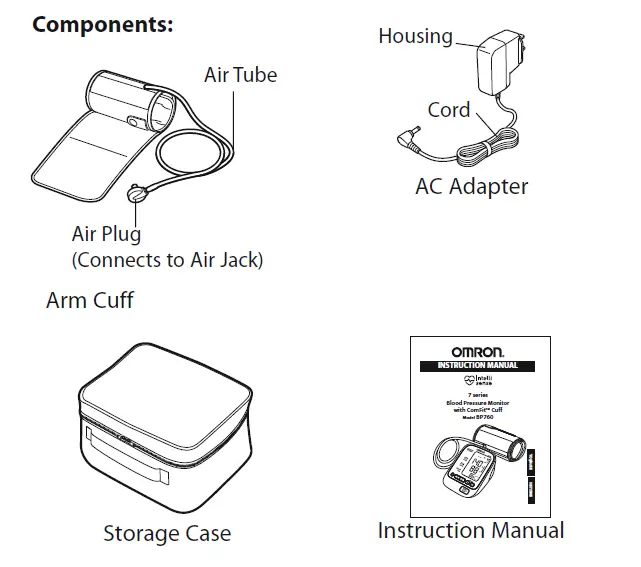
UNIT DISPLAY
DISPLAY SYMBOLS
IRREGULAR HEARTBEAT SYMBOL
When the monitor detects an irregular rhythm two or more times during the measurement, the Irregular Heartbeat Symbol will appears on the display with the measurement values.An irregular heartbeat rhythm is defined as a rhythm that varies by less than 25% from the average rhythm or 25% more than the average rhythm detected while the monitor is measuring the systolic and diastolic blood pressure.the irregular heartbeat symbol ( ) displays with your measurement results, we recommend you consult your physician. Follow the directions of your doctor.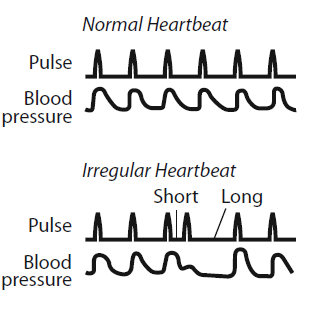
MOVEMENT ERROR SYMBOL
The Movement Error Symbol is displayed if you move your body during the measurement. Please remove the arm cuff, and wait 2-3 minutes. Take another measurement, remain still during inflation.The American Heart Association1 recommends the following guideline for upper limit of normal for home blood pressure readings:This is a general guideline because blood pressure depends on age and morbidity. The AHA recommends a lower home blood pressure goal for certain patients, including diabetic patients, pregnant women, and patients with renal failure1.
| AHA Home Guideline for Upper Limit of Normal BP | |
| Systolic Blood Pressure | 135 mmHg |
| Diastolic Blood Pressure | 85 mmHg |
The monitor is not intended to be a diagnostic device.
MORNING HYPERTENSION SYMBOL
The Morning Hypertension Symbol is displayed if the morning average reading for a week is above 135 for the Systolic Blood Pressure value and/or 85 for the Diastolic Blood Pressure value when viewing the Morning Averages and the Evening Averages in the memory.Omron Healthcare recommends you contact your physician if the MORNING HYPERTENSION SYMBOL and/or the HEARTBEAT SYMBOL appear on the display with your measurement values
TAKING A MEASUREMENT
The Heartbeat Symbol flashes on the display during the measurement. The Heartbeat Symbol flashes at every heartbeat.
- The Average Value Symbol is displayed when you press the memory button. The most recent average reading appears on the display screen.
- The Morning Average symbol is displayed when viewing Morning Averages using the Memory Function.
- The Evening Average symbol is displayed when viewing Evening Averages using the Memory Function.
- When the cuff is applied correctly, is displayed while taking a measurement or using the memory function. If the cuff is not applied correctly, is displayed.
USING THE AC ADAPTER
- For connection to a power supply not in the U.S.A., use an attachment plug adapter of the proper configuration for the power outlet.
- The power unit (AC Adapter) is intended to be correctly oriented in a vertical or floor mount position.
NOTES: Use only the authorized Omron AC Adapter that came with this monitor.
- We recommend you install the batteries even if the AC Adapter is used. If no batteries are installed, you may need to reset the date and time if the AC Adapter is disconnected. The measurement results will not be deleted.
CAUTION
Use only Omron authorized parts and accessories. Parts and accessories not approved for use with the device may damage the unit.
USING THE AC ADAPTER
TO CONNECT THE AC ADAPTER
- Insert the AC Adapter Plug into the AC Adapter Jack on the back side of the monitor as illustrated.
- Plug the AC Adapter into a 120V AC outlet (60 cycles).
TO DISCONNECT THE AC ADAPTER
- Hold the Housing to remove the AC Adapter from the electrical outlet.
- Remove the AC Adapter plug from the monitor.
WARNING
Do not plug or unplug the power cord into the electrical outlet with wet hands.
CAUTION
Do not overload power outlets. Plug the device into the appropriate voltage outlet.
BATTERY INSTALLATION
- Remove the battery cover with pulling the hook up while pushing it in the direction of the arrow.
- Install 4 “AA” size batteries so the +(positive) and – (negative) polarities match the polarities of the battery compartment as indicated.
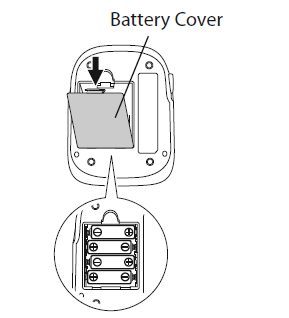
- Replace the battery cover.
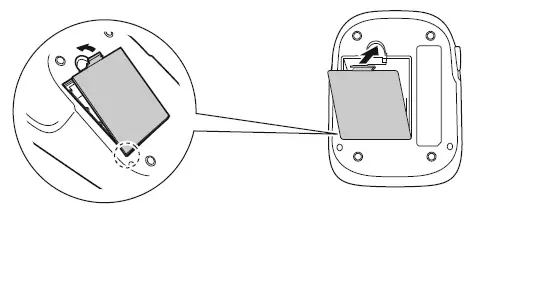
BATTERY REPLACEMENT
When the Low Battery Indicator appears on the display screen turn the monitor off and remove all the batteries. Replace with four new batteries at the same time. Longlife alkaline batteries are recommended.
CAUTION
If battery fluid should get in your eyes, immediately rinse with plenty of clean water. Contact a physician immediately.
NOTES:
- Turn the unit off before replacing the batteries. If the batteries are removed while the unit is still on, the date and time will be reset to that of the previous use. However, the measurement results are not deleted.
- When the batteries are replaced, you may need to reset the date and time. If appears on the display, refer to page 19, “Setting the Date and Time”.
- The supplied batteries may have a shorter life.
CAUTION
Dispose of the device, components and optional accessories according to applicable local regulations. Unlawful disposal may cause environmental pollution.
SETTING THE DATE AND TIME
Set the monitor to the current date and time before taking a measurement for the first time. If the date and time are not set correctly, the measurement values stored in the memory and the average values may not be correct.If the date and time are not set, appears during or after measurement.The Blood Pressure Monitor automatically stores up to 60 measurement values with the dates and times. The monitor also calculates weekly averages for measurements in the morning and in the evening. Morning and Evening averages are stored for this week and the last seven weeks.The monitor can also calculate an average reading based on the three most recent measurements taken within 10 minutes of the last reading.
NOTE:
If only two readings are stored in the memory for the 10-minute period, the average is based on the two readings.If one reading is stored in the memory for the 10-minute period, this reading is displayed as the average.
TO START THE SETTING
Press the SET button to adjust the date and time. The year flashes on the display.
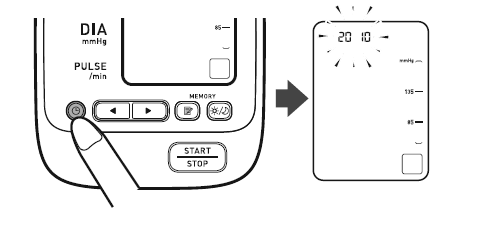
SETTING THE YEAR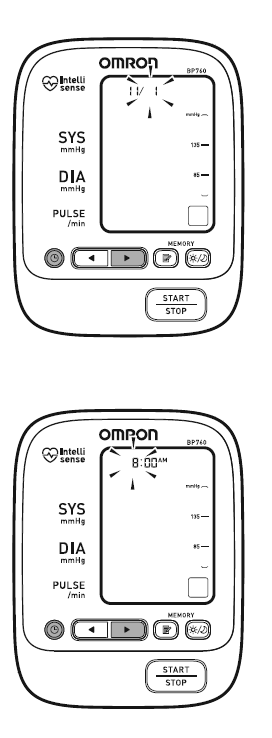
The year can be set between 2010 and 2040. When the display reaches 2040, it will return to 2010.Press the Up button to advance by increments of one year. Press the SET button to set the current year.The month flashes on the display.
NOTES:
Press the Down button ) to decrease the date and time values by decrements of one.Press and hold the Up or Down button to increase or decrease the date and time values faster.
SETTING THE MONTH
Press the Up button to advance by increments of one month.Press the SET button to set the current month. The day flashes on the display.
SETTING THE HOUR
- The time is set using AM or PM.
- Press the Up button to advance by increments of one hour.
- Press the SET button to set the current hour.
- The minute flashes on the display.
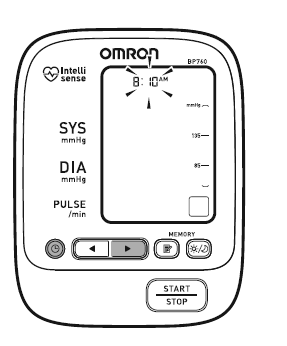
SETTING THE MINUTE
- Press the Up button to advance by increments of one minute.
- Press the SET button to set the minute setting.
TO TURN THE MONITOR OFF
- Press the START/STOP button.
APPLYING THE ARM CUFF
CAUTION
Read all of the information in the instruction manual and any other literature in the box before operating the unit.
CAUTION
This device is intended for use in measuring blood pressure and pulse rate in the adult population. Do not use this device on infants or persons who cannot express their intentions.
APPLYING THE CUFF ON THE LEFT ARM
- Make sure the air plug is securely inserted in the main unit.
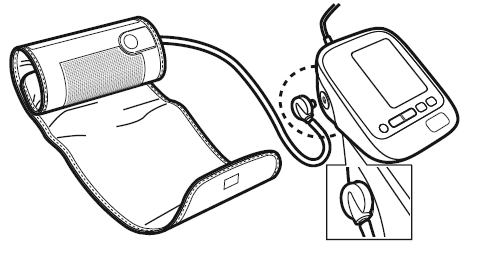
- Remove tight-fitting clothing from your upper left arm.
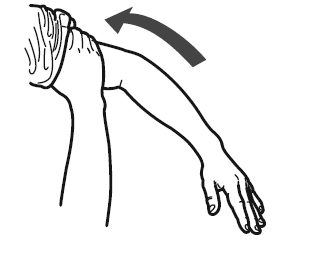
- Sit on a chair with your feet flat on the floor. Place your left arm on a table so the cuff is level with your heart.
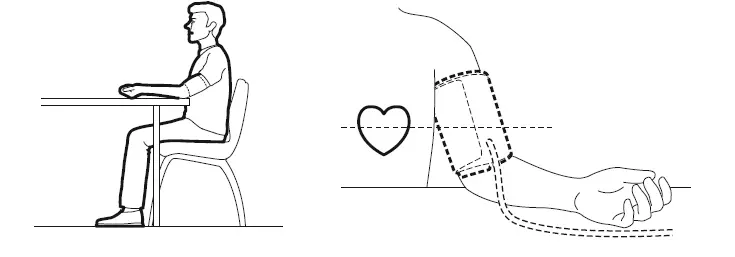
- Hold the thumb grip on the cuff securely with your right hand.
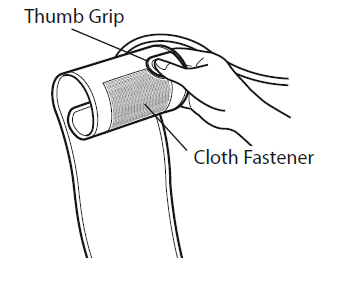
- Turn the palm of your left hand upward.
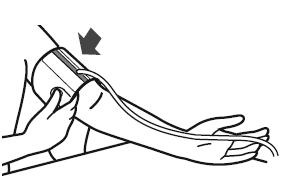
- Apply the cuff to your left upper arm so the blue stripe is on the inside of your arm and aligned with your middle finger. The air tube runs down the inside of your arm. The bottom of the cuff should be approximately 1/2″ above your elbow.
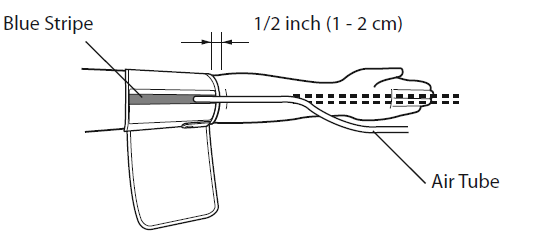
- Wrap the cuff firmly in place around your arm using the cloth fastener.
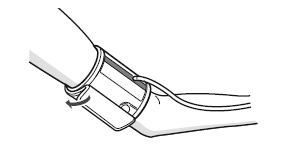
APPLYING THE CUFF ON THE RIGHT ARM
When taking a measurement using the right arm use this instruction for Step 6 on page 25.Apply the cuff to your right upper arm so the thumb grip is centered on the inside of your inner arm. The bottom of the cuff should be approximately 1/2” above your elbow.the flow of air to the cuff.
TAKING A MEASUREMENT
The monitor automatically determines your ideal inflation level. In rare circumstances when a higher inflation may be necessary, the monitor automatically re-inflates the cuff up to 30 mmHg higher than the initial inflation and restarts the measurement.
WARNING
Contact your physician for specific information about your blood pressure. Self-diagnosis and treatment using measured results may be dangerous. Follow the instructions of your physician or licensed healthcare provider.
CAUTION
Operate the device only as intended. Do not use the device for any other purpose.
CUFF WRAP GUIDE
This monitor checks whether the arm cuff is applied correctly during the inflation. When the cuff is applied correctly, is displayed while taking a measurement or using the memory function. If the cuff is not applied correctly, is displayed. If is displayed, refer to the section “Applying the Arm Cuff”, reapply the cuff and take another measurement.
- Press the START/STOP button. All symbols appear on the display.The cuff starts to inflate automatically. As the cuff inflates, the monitor automatically determines your ideal inflation level. monitor detects the pulse during inflation. Do not move your arm and remain still until the entire measurement process is completed.NOTE: To stop the inflation or measurement, press the START/STOP button. The monitor will stop inflating, start deflating and will turn off.

- Inflation stops automatically and the measurement is started. As the cuff deflates, decreasing numbers appear on the display. The Heartbeat Symbol ( ) flashes at every heartbeat.
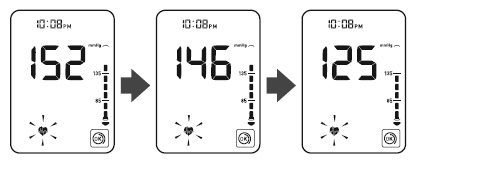
- When the measurement is complete, the arm cuff completely deflates. Your blood pressure and pulse rate are displayed.
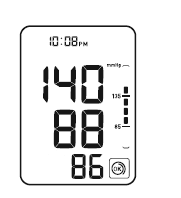
- Press the START/STOP button to turn the monitor off.
NOTE: The monitor will automatically turn off after two minutes.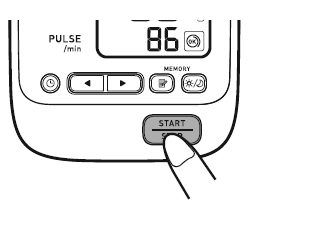
WARNING
Contact your physician for specific information about your blood pressure. Self-diagnosis and treatment using measured results may be dangerous. Follow the instructions of your physician or licensed healthcare provider.
WARNING
DO NOT adjust medication based on measurement results from this blood pressure monitor. Take medication as prescribed by your physician. Only a physician is qualified to diagnose and treat High Blood Pressure.
WARNING
The monitor is not intended to be a diagnostic device.
SPECIAL CONDITIONS
CAUTION
Inflating to a higher pressure than necessary may result in bruising where the cuff is applied.If your systolic pressure is known to be more than 220 mmHg, press and hold the START/STOP button until the monitor inflates 30 to 40 mmHg higher than your expected systolic pressure.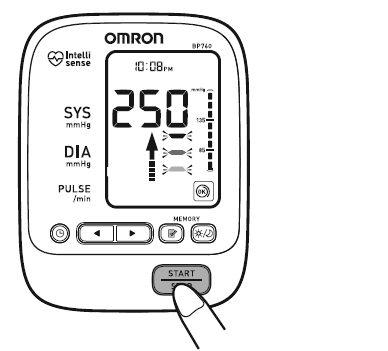
When the measurement is complete, the arm cuff completely deflates. Your blood pressure and pulse rate are displayed.
USING THE MEMORY FUNCTION
The monitor is designed to store the blood pressure and the pulse rate in the memory every time a measurement is completed. The monitor automatically stores up to 60 sets of measurement values (blood pressure and pulse rate). When 60 sets of measurement values are stored, the oldest record is deleted to save the most recent values. The monitor also stores 8 weeks of Morning Averages and 8 weeks of Evening Averages.
AVERAGING FUNCTION
The monitor calculates the average reading based on the three most recent sets of measurement values taken within 10 minutes of the most recent reading.
NOTES: If two sets of measurement values are stored in the memoryfor the 10 minutes period, the average is based on the two sets of measurement values. If one set of measurement values is stored, this is displayed as the average.When viewing the reading taken without setting the date and time, is displayed instead of the date and time.
TO DISPLAY THE MEASUREMENT VALUES
- Press the Memory button The Average Symbol appears on the display when the average reading is shown.
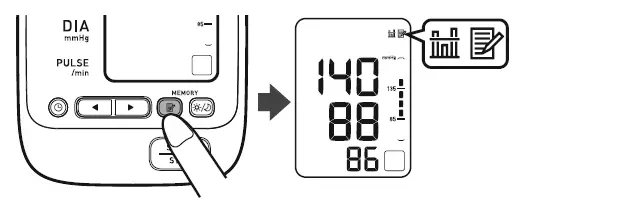
- Press the Down button for measurement values on the screen. The values are displayed from the most recent to the oldest.
NOTE: The date and time are alternately displayed with the measurement values.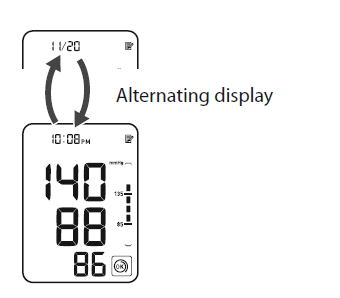
- Press the Up or Down button to display the next set of values.NOTE: Press and hold the Up or Down button to display the values faster.
MORNING AND EVENING AVERAGES
The monitor calculates and displays a weekly average for measurements taken in the morning ( ) and evening ( ). The monitor stores 8 weeks of Morning Averages and 8 weeks of Evening Averages.
NOTE: The week begins Sunday at 4:00 AM
MORNING AVERAGES
- Morning averages are based on the first reading. Measurement times must be between4:00 AM and 9:59 AM.
EVENING AVERAGES
- Evening averages are based on the last reading. Measurement times must be between:7:00 PM and 1:59 AM.
TO DISPLAY MORNING AND EVENING AVERAGES
- TO DISPLAY MORNING AND EVENING AVERAGES Average button ( ) to select the Morning or Evening average.The average for the current week “THIS WEEK” appears on the display.
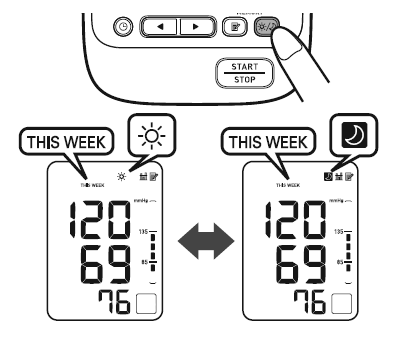
- Press the Down ) button to display the previous weeks.
- With each press of the Down button, the values are displayed from 1 week ago to the older.
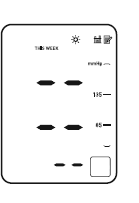
- Press the START/STOP button to turn the monitor off.
DISPLAY COMBINATIONS
In addition to the Morning Average and Evening Average Symbols, the monitor may also display the Morning Hypertension Symbol if the morning average for that week is above the AHA guidelines. (See page 13 for details.) Depending on your measurement results, these may be displayed in the following combinations.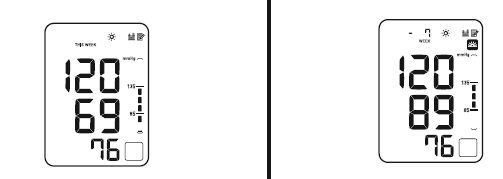
- Morning average from This Week with Morning Average Symbol
- Morning average from 7 weeks ago with Morning Average Symbol + Morning Hypertension Symbol
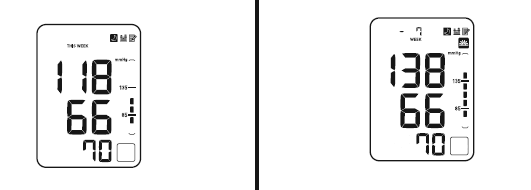
- Evening average from This Week with Evening Average Symbol
- Evening average from 7 weeks ago with Evening Average Symbol + Morning Hypertension Symbol
The Morning Hypertension Symbol ()appears if the weekly average for morning measurements is above 135/85.In this case the Morning Hypertension Symbol ()is displayed when the Evening Average is displayed, regardless of the values for the Evening Average.
TO DELETE ALL VALUES STORED IN THE MEMORY
You cannot partially delete values stored in the memory. All values will be deleted.
- . While holding the Memory button and the START/STOP button simultaneously for more than 2 seconds all values will be deleted.
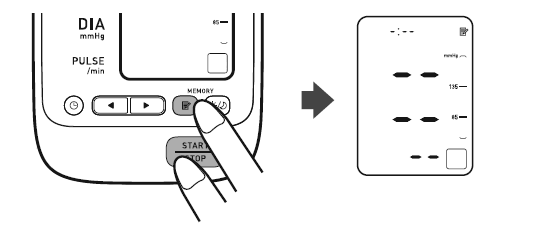
CARE AND MAINTENANCE
To keep your digital blood pressure monitor in the best condition and protect the unit from damage, follow the directions listed below:
- Keep the monitor in the storage case when not in use. Make sure the AC is placed under the main unit so that it does not damage the display.
- Avoid kinking or sharply bending the AC
- Adapter cord.
- not forcefully bend the arm cuff or air tube. Do not fold tightly.
- Clean the monitor with a soft dry cloth.
- Do not use any abrasive or volatile cleaners.
- Do not attempt to clean the cuff.
CAUTION
Do not submerge the device or any of the components in water. Do not subject the monitor to extreme hot or cold temperatures, humidity or direct sunlight.
CAUTION
Store the device and the components in a clean, safe location.
CAUTION
Do not subject the monitor to strong shocks, such as dropping the unit on the floor.
Remove the batteries if the unit will not be used for three months or longer. Always replace all the batteries with new ones at the same time. Use the unit consistent with the instruction provided in this manual.
CAUTION
Changes or modifications not approved by Omron Healthcare will void the user warranty. Do not disassemble or attempt to repair the unit or components.
CAUTION
Use only Omron authorized parts and accessories. Parts and accessories not approved for use with the device may damage the unit.
ERROR INDICATORS AND TROUBLESHOOTING TIPS
TROUBLESHOOTING TIPS
| PROBLEM | CAUSES AND SOLUTIONS |
| No power.
No display appears on the unit. |
Replace all four batteries with new ones.
Check the battery installation for proper placement of the battery polarities. |
|
Measurement values appear too high or too low. |
Blood pressure varies constantly. Many factors including stress, time of day, and how you wrap the cuff, may affect your blood pressure.
Review the sections “Before Taking a Measurement” and “Taking a Measurement.” |
FCC STATEMENT
NOTE:
POTENTIAL FOR RADIO/TELEVISION INTERFERENCE (for U.S.A. only)This product has been tested and found to comply with the limits for a Class B digital device, pursuant to part 15 of the FCC rules.These limits are designed to provide reasonable protection against harmful interference in a residential installation. The product generates, uses, and can radiate radio frequency energy and, if not installed and used in accordance with the instructions, may cause harmful interference to radio communications. However, there is no guarantee that interference will not occur in a particular installation. If the product does cause harmful interference to radio or television reception, which can be determined by turning the product on and off, the user is encouraged to try to correct the interference by one or more of the following measures:
- Reorient or relocate the receiving antenna.
- Increase the separation between the product and the receiver.
- Connect the product into an outlet on a circuit different from that to which the receiver is connected.
- Consult the dealer or an experienced radio/TV technician for help.
POTENTIAL FOR RADIO/TELEVISION INTERFERENCE (for Canada only)
This digital apparatus does not exceed the Class B limits for radio noise emissions from digital apparatus as set out in the interference-causing equipment standard entitled “Digital Apparatus”, ICES-003 of the Canadian Department of CommunicationChanges or modifications not expressly approved by the party responsible for compliance could void the user’s authority to operate the equipment.
LIMITED WARRANTIES
Your Omron® BP760 IntelliSense® Automatic Blood Pressure Monitor, excluding the arm cuff, is warranted to be free from defects in materials and workmanship appearing within 5 years from the date of purchase, when used in accordance with the instructions provided with the monitor. The arm cuff is warranted to be free from defects in materials and workmanship appearing within one year from the date of purchase when the monitor is used in accordance with the instructions provided with the monitor. The above warranties extend only to the original retail purchaser.We will, at our option, repair or replace without charge any monitor or arm cuff covered by the above warranties. Repair or replacement is our only responsibility and your only remedy under the above warranties.
To obtain warranty service contact Customer Service by calling 1-800-634-4350 for the address of the repair location and the return shipping and handling fee.
Enclose the Proof of Purchase. Include a letter, with your name, address, phone number, and description of the specific problem. Pack the product carefully to prevent damage in transit. Because of possible loss in transit, we recommend insuring the product with return receipt requested.
THE FOREGOING IS THE SOLE WARRANTY PROVIDED BY OMRON IN CONNECTION WITH THIS PRODUCT, AND OMRON HEREBY DISCLAIMS ANY OTHER WARRANTIES, EXPRESS OR IMPLIED, INCLUDING IMPLIED WARRANTIES OF MERCHANTABILITY AND FITNESS FOR A PARTICULAR PURPOSE. IMPLIED WARRANTIES AND OTHER TERMS THAT MAY BE IMPOSED BY LAW, IF ANY, ARE LIMITED IN DURATION TO THE PERIOD OF THE ABOVE EXPRESS WARRANTY.OMRON SHALL NOT BE LIABLE FOR LOSS OF USE OR ANY OTHER SPECIAL, INCIDENTAL, CONSEQUENTAIL OR INDIRECT COSTS, EXPENSES OR DAMAGES.
This warranty provides you with specific legal rights, and you may have other rights that vary by jurisdiction. Because of special local requirements, some of the above limitations and exclusions may not apply to you.
SPECIFICATIONS
NOTE:
These specifications are subject to change without notice.
FAQS
Where is this made?
Vietnam
Is there an Ac adaptor available?
An ac adapter is available as an option
does it come with a power cord?
No it does mot come with a power cord. It comes with 4 2xa batteries.
Does this unit measure heart rate? If yes, does it store it like its stores the blood pressure readings?
Yes it records & stores your heart rate data. It is an excellent device
does it come with a carrying case?
Yes it did. Please note: it did not come with an ac adapter.
does it come with a carrying case?
Yes it did. Please note: it did not come with an ac adapter.
Can this be used on the lower arm?
BP CUFFS are only made to be used on upper arm. Results will not be accurate if used on lower arm.
Does this model alert me when the cuff is not on correctly?
It will set an Error if it thinks the cuff is too loose and not pressuring properly and getting a reasonable reading …or if you move around while taking a reading. But otherwise, no. If you line it up on your arm as it instructs .. the exact tightness is not critical. It will compensate for small variances . Should be snug..but not pinching tight or sloppy loose.
Is the cuff 16cm (6 in) wide?
5.75 inches
How do I know if the BP760 is ready to take my blood pressure?
When the warm-up period is complete, the display will show an animated heart symbol and a message that reads “WAIT.” The heart symbol indicates that you should wait until the monitor is ready to take your blood pressure. This may take up to 2 minutes depending on your body position.
How do I know if my blood pressure reading is accurate?
The BP760 has been validated against a mercury sphygmomanometer (standard blood pressure measurement device). In addition, Omron’s clinical studies have shown that readings taken with the IntelliSense® technology are comparable to readings taken with a manual cuff. However, variations in individual readings may occur due to environmental conditions or individual differences.
What should I do if my readings are consistently higher than what my doctor says they should be?
Your doctor may want you to check your blood pressure at home more often. He or she may also want you to use a different monitor or cuff size. If none of these actions resolve your problem, contact your doctor for further advice.
How often should I check my blood pressure?
Check your blood pressure once daily in the morning before getting out of bed and after you have been sitting for at least 5 minutes. Record this reading in a notebook or on a calendar chart so that you can see if there is any pattern to your readings (e.g., higher readings in the morning than at night). Your doctor may recommend checking more often and/or using other devices such as an automatic blood pressure cuff, 24-hour ambulatory monitor or home blood pressure machine. Follow your doctor’s instructions carefully. If you have diabetes, consult with your doctor about how often you need to check your blood pressure and whether any special equipment is needed for monitoring purposes. If you are taking medication for high blood pressure, consult with your doctor about how often you need to check your blood pressure and whether any special equipment is needed for monitoring purposes. For more information about home monitoring, ask your doctor or pharmacist for recommendations or contact Omron Healthcare Inc., Dept. 888-746-5626 (USA), www.omronhealthcareusa.com .
What are some common causes of high and low readings?
Some common causes of high readings include being nervous, having an enlarged vein in the arm (varicose veins), being dehydrated, exercising within 30 minutes of taking a reading, being on a diet
does it come with a carrying case?
Yes it did. Please note: it did not come with an ac adapter.
Will the blood pressure monitor be covered by Medicare for seniors?
Contact Medicare directly and they will send you one.
Does this have the capability to send bp data to a printer via bluetooth?
Using the app allows you to export to a CSV file which can be printed.
Does this have an AC adapter port?
Yes there is a DC 6v port on the right side but they did not have an adapter enclosed in the kit.
